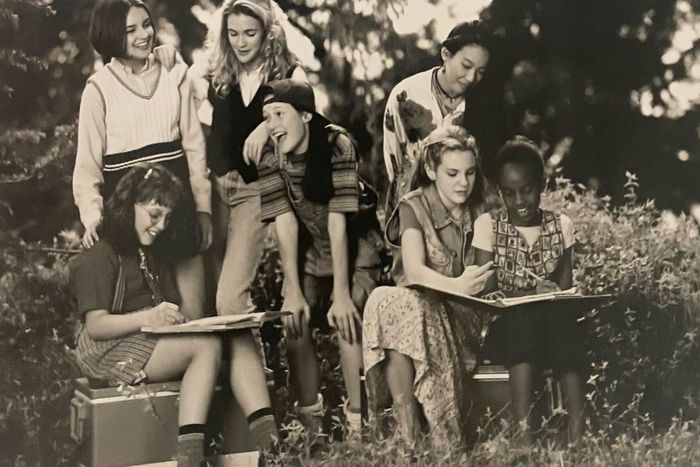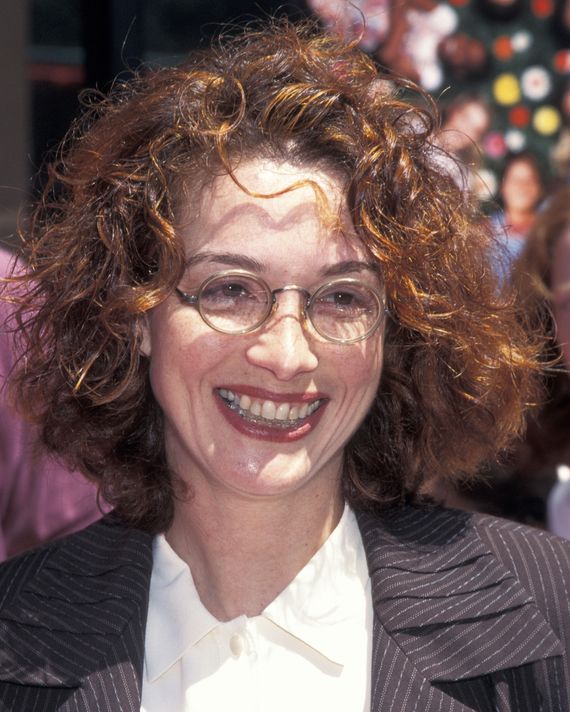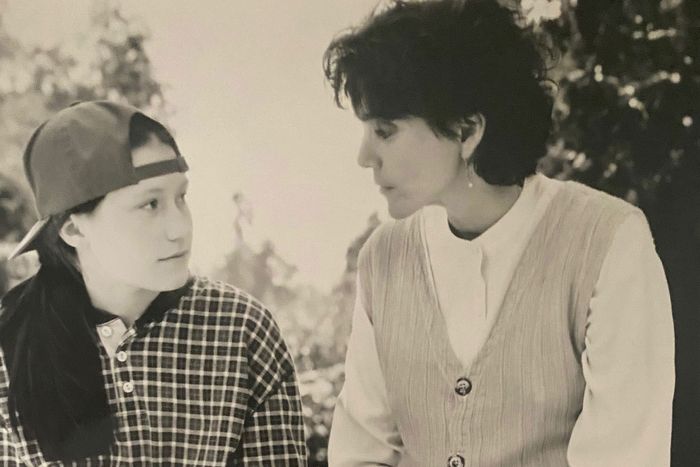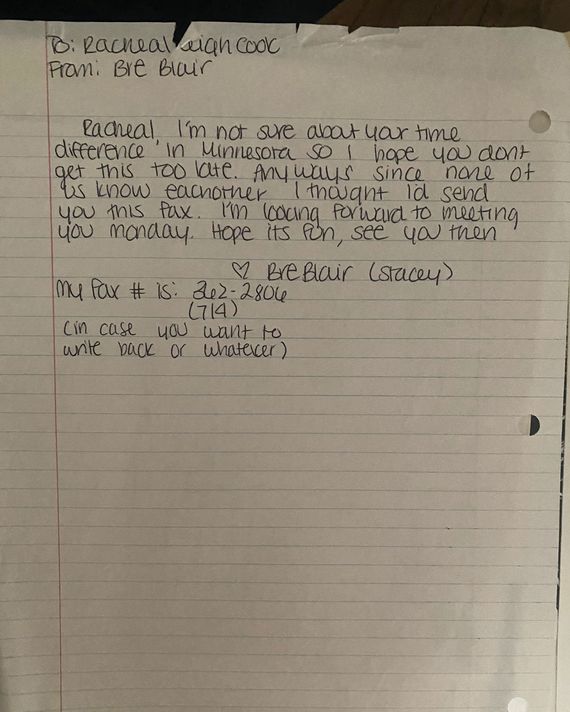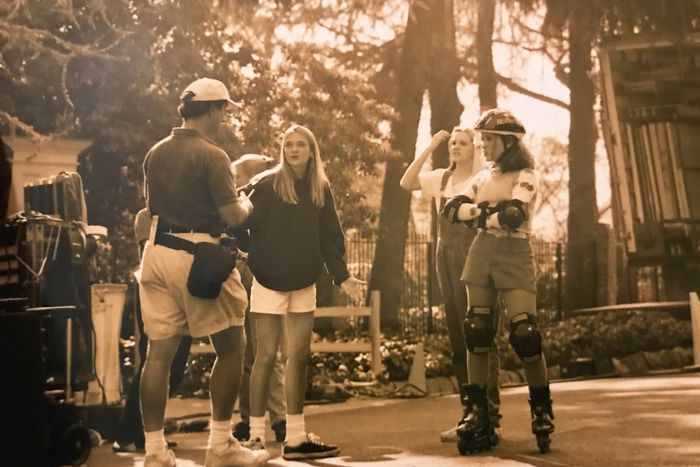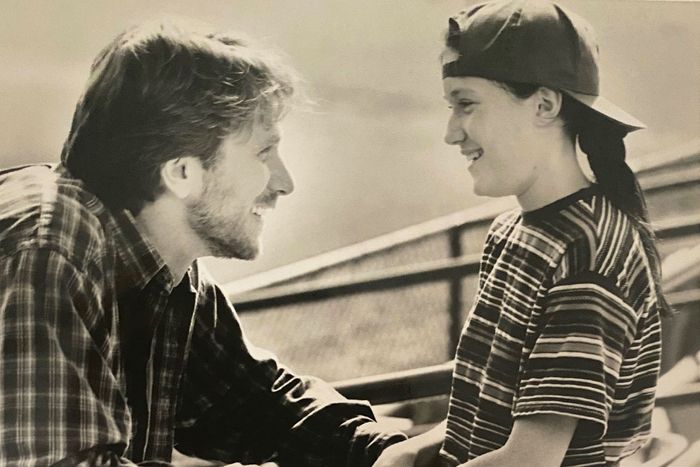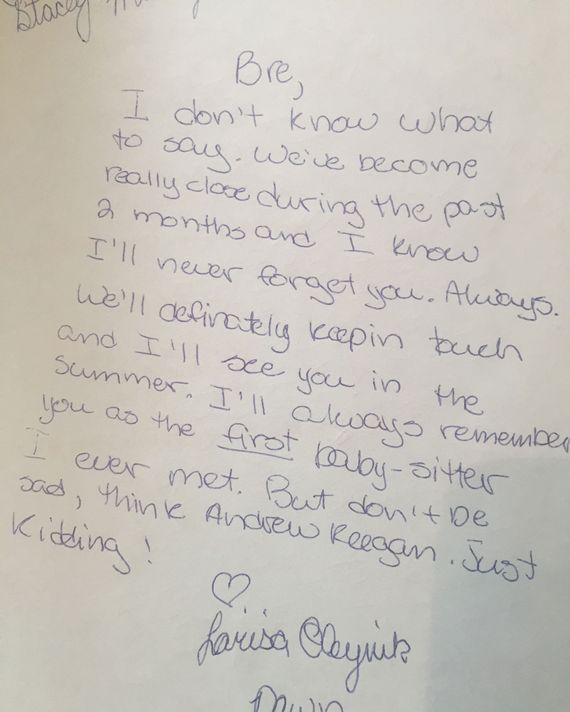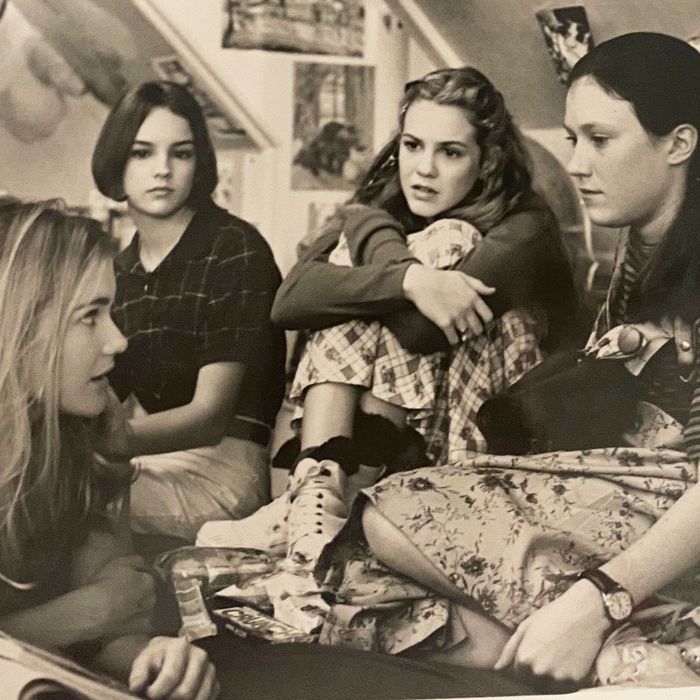
In 1986, The Oprah Winfrey Show began beaming out of American screens, “How Will I Know” poured out of everybody’s radios, and the first pastel-covered Baby-Sitters Club book by Ann M. Martin started filling the shelves of young readers the nation over. Kristy’s Great Idea (which was for a group of middle-school girls to gather around a landline phone every Monday, Wednesday, and Friday afternoon so neighborhood parents could call in and reserve their babysitting services) came first. Within a year, Scholastic had published the first six books of a series that would grow to contain over 200 entries — including mysteries, California diaries, Super Specials, and kid-sister-centric spinoffs — following the travails, early crushes, family struggles, and evolving friendships among an entrepreneurial group of middle-school girls in the fictional Stoneybrook, Connecticut.
Around the time Scholastic started ordering books by the dozen, the company’s film division, led by Jane Startz, reached out to Melanie Mayron about directing a movie based on the beloved series. Best known for her Emmy-winning portrayal of Melissa Steadman on the coming-of-age drama thirtysomething, Mayron had never directed a feature film before, and she’d never read a Baby-Sitters Club book (let alone watched the straight-to-VHS specials or HBO series that predated the movie). “I’ve still never read the books,” she told Vulture this month. “But there was a New York Times Sunday magazine cover called ‘Girls: Confident at 11, Confused at 16,’ [about how] young women, before they hit puberty, are speaking their mind. They’re very serious and confident about whatever they’re thinking, and then when puberty starts and they want the attention of boys, they all of a sudden couch their words. They don’t answer as confidently anymore. And I thought to myself: You don’t get that confidence back until you’re 40 and you’ve been through a bunch of therapy! And that was the main reason I wanted to do this movie.”
When the movie debuted in 1995, it arrived to generally positive reviews (“Movies don’t get much more beguiling than The Baby-Sitters Club,” the Los Angeles Times wrote; “The movie […] plays like an elongated ‘After School Special,’” the San Francisco Chronicle countered) and less-than-positive box-office results (it was the ninth most watched movie the weekend of August 18, right behind Mortal Kombat). But the movie endured as a VHS classic, watched and rewatched at many a slumber party by a generation of girls who saw themselves in one or several of the seven main characters. Twenty-five years later, the franchise is enjoying something of a renaissance, complete with a new Netflix adaptation. Vulture caught up with director Melanie Mayron and most of the beloved cast of the ’95 film about the first kisses, first periods, and almost-perms involved in bringing a saga of teenage babysitters to the big screen.
Casting: ‘You’re Going to Have to Perm Your Hair’
Shooting started just four months after Scholastic hired Mayron to direct the script (written by Dalene Young), meaning casting had to happen quickly. Over 4,000 girls auditioned to play the members of the Baby-Sitters Club: President Kristy Thomas, a headstrong tomboy; her shy childhood best friend, Mary-Anne Spier; Claudia Kishi, an A+ artist but a C- student; Stacey McGill, a boy-crazy New York City transplant with diabetes; Dawn Schafer, a sensitive California-born environmentalist; and two junior sitters — aspiring author Mallory Pike and ballerina Jessi Ramsey. Then there was the matter of finding the adult cast, including Mrs. Haberman, the sitters’ summer antagonist, and Kristy’s parents. For the former, Mayron went with a certain famous friend from the Actors Studio. For the latter, the director tapped two of her former co-stars: Carwash’s Brooke Adams and thirtysomething’s Peter Horton.
Melanie Mayron, director: Everybody was thinking, It’s a kids movie, but I wanted it to have a great cast. Ellen Burstyn is a dear friend. She was in my very first movie I ever acted in, Harry and Tonto. We were friends since before then, from the Actors Studio, and I asked her if she would play Mrs. Haberman.
Peter Horton, Patrick Thomas (Kristy’s dad): Mel suddenly had this movie to direct, and it called for a charming, sort of overtly-good dad who is really a bad dad, and she immediately thought of me. She actually directed me in the very last thing I acted in, where I also played a very overtly-charming but bad dad. So I’m beginning to think that’s her impression of me.
Mayron: Larisa had already been on Alex Mack. She was clearly more of a pro at that point.
Larisa Oleynik, Dawn: I was into the books. I got really into the books as I was auditioning, though. Because even as a 13-year-old, I was like, “I should probably do my homework.” I was auditioning for three different characters — Kristy, Stacey, and Dawn — simultaneously.
Bre Blair, Stacey: I was in the eighth grade, so I was 14. I’d read all the books. And I was very excited to play boy-crazy Stacey.
Mayron: Oh God, Bre was fantastic. Bre just had that Stacey kind of confidence and beauty, like she was the girl who had everything.
Blair: They said, “You’re going to have to perm your hair,” and my mom and I both said no to that. I would put my hair in rollers every single day. So all the old pictures of me on set are of my hair in rollers.
Stacey Linn Ramsower, Mallory: I was pretty devastated at the first costume fitting. Looking back on it now, I feel totally different, but for a 12-year-old girl who felt super awkward in her skin, I did not want to wear suspenders and bow ties. I remember the costume designers telling me how much they loved dressing me — paisley shirts and a briefcase and oxfords. They dyed and permed my hair. It was a complete and total change, physically.
Oleynik: I very much let it be known that [Dawn] was my preference. Her sensitivity resonated with me … But I didn’t look like how Dawn was supposed to look in the books. That was a big deal. To dye my hair and have those extensions in. Maybe one-third of that is my real hair.
Mayron: Zelda [Harris] had been in a Spike Lee movie.
Zelda Harris, Jessi: I am so different from Jessi. She’s very prim and proper, very collected. In a lot of ways, she’s the opposite of who I am. But I remember [thinking]: How do I explain that I’m perfect to play Jessi because I’m a girl who believes in herself? I’m a girl with a can-do attitude. I think that’s the spirit behind these books and the corresponding fandom.
Mayron: I remember Rachael Leigh Cook. She came in and she was so cute.
Rachael Leigh Cook, Mary-Anne: I was a huge fan of the books. I was right in the pocket for being the right age for [them]. In retrospect, that was probably, literally, my only qualification for getting this job. I remember having no concept of if [the audition] had gone well or not.
Mayron: I asked her what she had done before and she said, very proudly, “Well, I was on the cover of the Milk-Bone box.”
Cook: I was 14 or 15 years old. I was living at home with my parents having a very normal life in Minneapolis, and it was sort of the classic experience of getting this call that changed my life.
‘We’ve Got Kristy’
Finding the right actress for one of the two remaining baby-sitter roles was easy: production found its Claudia in Tricia Joe, who at 18 was the oldest girl in the group. (Neither Joe nor Ann Martin responded to our requests for interviews.) Kristy, however, remained harder to cast.
Cook: They couldn’t find their Kristy, who was the linchpin of the movie. They tried me on for that as well.
Mayron: We had everybody but Kristy. And here’s the deal: Young women’s bodies are all developing at different ages. Kristy had to have that kind of tomboyish thing, so she couldn’t be somebody that was really that developed yet physically, but she had to be good enough to be the leader and be a Kristy and be able to do the emotional scenes as well as the lighter scenes. It was a little more layered and complicated part to cast. And basically, we didn’t find anyone.
Schuyler Fisk, Kristy: I was 11 at the time, and I was aware of The Baby-Sitters Club book series, but I hadn’t read the books. I was pretty focused on doing community theater. My life goal, from the time I can remember, was to be an actress in the movies. My parents were really cautious about letting me 100 percent pursue that.
Mayron: Sissy Spacek is one of my oldest friends. We had the same manager when we were 20, 21 in New York. We’d both been in the movie Missing together. Her nephew, Steven Spacek, was my assistant at the time, and he said, “You know, [Sissy’s daughter] Schuyler is in the seventh grade, doing musicals back in Virginia.” So we faxed scenes to Sissy and her husband Jack [Fisk]’s farm in Virginia, and they taped her audition, with Sissy reading the lines off-camera — an Academy Award winner, reading off-camera lines. Jack had to drive to a FedEx store in a storm and drop off the videotape.
Fisk: It’s crazy thinking back on it, because I had no idea what an incredible opportunity it was. I wasn’t fully aware of what a life-changing thing this would be for me.
Mayron: I got the tape a couple of days later. I remember putting the videotape in the machine and I just burst into tears. [While she was performing] a cat jumped on her lap and she just kept doing her lines and petting the cat. She was just Kristy! She was it. And I called the producers and said, “We’ve got Kristy.”
Fisk: It was literally a week later, I was on a plane to L.A. with my dad and I was like, “No, this is a mistake, they got the tapes mixed up, there’s no way they really meant me.”
Pre-Shoot Bonding: ‘Melanie, I’m Crying!’
About a week before filming began, the cast flew out to California and checked into their very swanky shoot accommodations. An Embassy Suites? A Residence Inn? Reports differ, but it was some place with a macaroni bar in the greater Los Angeles area. Mayron needed their relationships to feel real and lived-in, so she set the girls up to bond as much as possible in that seven-day period.
Blair: The first person I met was Larisa. We were at the hotel, and she was so cool and wearing these overalls, and I just wanted to be her best friend immediately. I remember Zelda being super shy and sweet.
Harris: I was younger than everyone. I wanted to really be able to be in that big girl space and be cool, but the age difference was so prevalent. I remember being nervous about that. I also was super excited to meet Larisa because I’d seen her work on Alex Mack. And Rachael. I didn’t want to embarrass myself in front of this league of legendary ladies.
Cook: We were all looking at Zelda like she was the real actress amongst us, because she had been in a Spike Lee movie that everyone knew to be cool. We were all like, she’s the real thing. And Larisa had been in a show, [so] when you wanted to tell people who was in the movie, she was the person you’d bring up, to say, “Yeah, Alex Mack is in it.”
Oleynik: With Zelda, I think even I was like “Oh shit, this girl’s done a movie.”
Fisk: We had a full week of working with Melanie, getting to know each other, getting into our characters before we started shooting. What a luxury! Obviously, that’s never happened again in my acting life.
Oleynik: We just hung out. It never ended. We would swim together, and eat dinner together, and I don’t really remember any separation at all. We were just constantly together.
Blair: There was a lot of bonding happening. And we were all very different, mind you. Just as people. We were all very different personalities.
Horton: It was one of the first times I really felt like a grown-up who had nothing to do with this world of kids. They all had such a camaraderie together. They all had such fun together … and when I walked in the room, they’d all get quiet.
Blair: Peter Horton — we all had a crush on him. Like, Kristy’s dad is so hot!
Mayron: My friend Catlin Adams, a wonderful acting teacher, made up an exercise that I spent a day doing with the girls called “This Is Your Life.” One person would stand up and talk about themselves for five minutes, and then the whole group could ask them any questions. And then they’d talk as their character for five minutes, and then everybody could ask them questions for five minutes. And we did that for every girl and character.
Fisk: As Kristy, I had a big crying scene in the movie, and I was really nervous about that. I’d done a lot of theater and stuff, but I’d never had to cry. So we did this acting exercise where I was telling this story, just as me, Schuyler, about my dog Lucky, who’d just gotten hit by a car in front of my eyes. And as I was telling this story I just burst out crying, completely unexpectedly, and I looked at Melanie and I was like, “Melanie, I’m crying!” It was such a funny moment. I’ll never forget that. There was something in me that knew: I can access this place. I can do it. I can act in the movie.
Mayron: When we got done, I said to them, “You know, I think you guys now know more about each other than you probably know about some of your best friends at home.” It was the day before we started shooting.
Cameras Roll: ‘This Is the Hottest Set in Town’
The shoot, which took place in the first two months of 1995, was 35 days long. Even though the weather and a tight turnaround made filming a challenge, Mayron kept things playful on a set that was teeming with as many kids as A-listers.
Mayron: We were shooting in January and February. In Los Angeles, that’s the rainy season. When you schedule a movie, you get what’s called “cover days”: If there’s rain, you can go to cover and do some scenes inside somewhere. We blew past our cover days right off the bat, so the whole schedule was a bit like 52-card pickup. We were at Disney ranch and I remember the A.D. saying over the walkie-talkie, “What scene should we do next?” “Check the makeup trailer! Who’s available?”
Ellen Burstyn, Mrs. Haberman: It was very happy, and I would have to say, girlish. There was lots of fun and play and giggling and having a good time. Melanie is a girly girl herself. She’s a wonderful director, but she has a kind of — what shall I say — a young quality, and she did especially then.
Blair: I just remember on set, Melanie, she was wearing this skirt — she had awesome style, she’s just so cool — and she lifted [it] up in front of us and had fluffy bloomers on. Just flashing us to make us laugh.
Mayron: Not only do I have all the girls, but I have all their parents there the entire time. Kevin Costner was friends with one of the producers, so his two girls played the one [camper] who didn’t talk and her friend. He was on the set, and Sissy was on the set. I remember my friend Candy came and said, “This is the hottest set in town.”
Christian Oliver, Luca: I remember one day, I was throwing a football with Kevin Costner on set because his girls were in the movie. Everybody who was anybody wanted to be in this movie.
‘They Were All Teaching Me How to Use a Tampon’
It was a coming-of-age saga onscreen and behind the camera: Bre Blair had her first real kiss with the (much older) actor Christian Oliver, who played Stacey’s (much older) love interest, Luca, the Swiss cousin of her babysitting charge. (Never forget the “I just can’t believe you’re only 13” line.) So of course she got her first period on the day she had to do the big scene.
Mayron: The first kiss Bre ever had was in the film, and needless to say, it was a huge deal and had to be handled very delicately.
Oleynik: Poor Bre! I, too, had my first kiss onscreen and I don’t recommend it. It sucks!
Blair: It was terrifying! I didn’t want to do it. And I think part of the reason I was nervous was he was quite a bit older than me. I was 14 and he was 22. He was this really cute guy from Germany. I mean, I was dying.
Cook: The absolute only thing I can say in defense of that [age gap in] casting is, I ran into him at another casting ten years later and he still looked the same.
Oliver: I was the boy walking [onto set with] a bunch of cute little girls — not even teenagers, I think. I was a little older. I was on Saved by the Bell: The New Class, and I’d been in some teen magazines.
Oleynik: I think, honestly, if we’re going to be real about the audition process, that’s the reason I didn’t want to be Stacey. I was like, “I’m good on Stacey.” I don’t want to have to kiss a boy. I did a movie with Christian recently, and I brought that up, and he was like, “Oh God, I’m sure she was embarrassed. I was mortified, too.”
Oliver: [Blair’s] mom was there. And of course all the girls gave her a lot of crap. They were all giggling. They had to kind of restrain everybody from being on set.
Mayron: I told [Bre] the camera would be far away, so that all the crew and everybody wouldn’t be right in her face and she would feel more private. I told her we would only do one camera angle. And we had to get it right, but I would try not to have to shoot it over and over and over again … I was like, “You just have to pretend you’re the character and you like him.”
Blair: I’ll never forget it. It was right before I had to go do the first kissing scene. I had the best ’90s wardrobe ever. It was like these white ’90s shorts with this little DKNY rayon outfit. And I got my period. I did not want to come out of my trailer because I was so embarrassed. I was realizing I was kind of a late bloomer, so I was so nervous! And my mom was like, “You can do this!” I’m sure she felt terrible. [But] I remember being in our hotel room, and all the girls came in my room. They were in the bathroom. It was Larisa in there with me, and they were all teaching me how to use a tampon. How much better does it get than that?
Oleynik: I think Stacey who played Mallory was part of that, too. It was a group effort. And I remember I got my period not long afterwards, and I was like, I know who to call.
Blair: There’s another scene where I have to kiss [Oliver] at the end of the film, and I was told we were going to potentially have to reshoot that first kiss, and I started crying. “I don’t want to do it again!”
‘You Can Have Comedy, But There’s a Deep Punch’
The movie’s primary plot follows the Baby-Sitters Club members as they try to run a day camp without maiming, losing, or killing any children. But for Kristy, there’s another drama playing out: Her dad, who left her mom years ago and has only sporadically been a presence in her life, surprises Kristy by coming back to Stoneybrook and coercing her into keeping his return a secret.
Fisk: My first day shooting I worked with Peter Horton. It was the scene where [Kristy’s dad] comes back. She has this complicated relationship with her dad; he’s been gone and she loves him and looks up to him in a way, but she also recognizes that he’s not always there. It was sort of a heavy, emotional scene.
Horton: She was so much fun to act with, because she had her mother’s gift of being able to truly be in the moment. It wasn’t like so many kids who are that age, who have been overtrained in a way. Schuyler had an authenticity with her. You didn’t know what she was going to do.
I remember that being a really uncomfortable scene to do … It just was this odd feeling for me, because I was at a point in my life where I really wanted kids. I really wanted to be the good dad. So to play this dad who had a kid who he really wasn’t attentive to, and in this scene, to sort of live that reality, was difficult for me. I remember Melanie being very kind and patient with me, to try to make this performance nuanced.
Oleynik: The stuff with Peter and Schuyler is so heartbreaking. You totally get why she would be so charmed by him, and you can’t really hate him. It’s a complex relationship! It’s deep material. Not gonna lie, I didn’t quite understand that when we were filming.
Blair: The author [Martin] came to visit us on set, and I remember her saying she wrote these books from a feminist perspective and wanted these girls from different backgrounds, not just racial but family — different life perspectives.
Mayron: The thing that I have always liked [about this movie] is, you can have the comedy, but there’s a deep punch. There’s a big emotional underbelly to it. And with the young women and the ages they are — 10 to 15, that little core group of girls — it can get very emotional.
Ramsower: Through every scene, we were becoming closer — becoming these characters who were driven and excited and struggling and just really loved each other.
Oleynik: The scene when we’re all at the cabin for Kristy’s birthday, and someone says to Kristy, “You’re important to us.” That level of deep affection that you see with us — the way that we’re all touching each other and holding each other and literally cradling each other in support — that’s still sort of rare, I think, to see that level of friendship onscreen. Really unabashedly affectionate.
Blair: It was funny because it’s a scene about coming together and supporting your friend, and we all started crying. The bonding had been in place.
Mayron: I think it was the last night we shot. We were at Griffith Park. We had big rain machines, [for] when Kristy is walking home in the rain and the girls drive up and find her, and they get out and they all go to hug her. When they got into the hug and were all crying with her, they just stayed there for almost 25 minutes. It was so sweet! Because they did get to be that group! They bonded. They were just crying and holding onto each other and they were soaking wet — like little drowned rats.
Harris: So there’s rain and there’s set rain. And set rain is usually really cold. I remember being freezing. We all embrace, and I’m clinging onto everyone for sheer body warmth … And I cried, because the closeness and the warmth, but also because it was a realistic, microcosmic metaphor for what we were actually doing there: We gathered to tell this really beloved story of these really beloved girls. And there we were, out there doing it.
Mayron: It was so touching. The parents kept coming up asking, “What’s going on?” And I said, “Just leave them.”
The Premiere: ‘Being a Little Black Girl and Having Girls Who Are White Tell You Your Character Is Their Favorite — That Rocked My World’
The initial plan was for the movie to come out in September with the support of Scholastic’s back-to-school promotional machine, however, at the last minute, The Baby-Sitters Club was rushed out for an August 18 premiere date. The girls did a nationwide tour, meeting fans and signing books, but their charm offensive did little to boost things at the box office; the movie only made $3.4 million opening weekend and sputtered out of theaters not long after Labor Day.
Mayron: The premiere was in the afternoon at Sony Pictures, just because it was a kids film.
Oleynik: A lot of us showed up in a slip dress — a slip dress with a motorcycle boot-situation, [probably from] Wet Seal. There was a full-blown carnival. As I recall the movie did not make that much at the time, so I’m sure whoever threw that party was like “whoops!”
Mayron: It didn’t make the kind of money they wanted it to make. But it was supposed to be released at the beginning of the school year, with the support of Scholastic, and then all of a sudden they made the release date August 18, which is the worst release date in the summer, because no one is home and there aren’t going to be people around to see the movie. I have no idea [why they moved it]. It was horrible when that happened. I didn’t feel it was supported as well as it should have been. But I know the VHS tape was out and it was seen.
Harris: We did this promotional tour through a few different states. We signed girls’ copies of The Baby-Sitters Club, and that was really incredible. That gave me the most clarity about the overall reception of the film, that girls — predominately girls and their moms — were pouring out to these events, standing in line with their books, with their merch, to talk to us and to tell us what they loved. And we’re talking hardcore fans. Girls who have read every single book. As soon as it hits the shelves they’re reading it that night, in that pre-Harry Potter world.
Blair: We went all over: Atlanta, New York, Minnesota. We were at malls, we were at waterparks, amusement parks. We went to hospitals. It was really fun. And really wild to see all the fans, because they’re all my age.
Cook: They teamed me up with Tricia Joe [on the promotional tour], who I was really close with during the filming. I haven’t seen her since. She’s been reached out to and I think she’s just busy — I would just say that. I really treasured her friendship during that movie and I feel sad that we lost touch.
Ramsower: I toured with Rachael for a couple of cities, and Zelda, and also on my own. We did radio spots and book stores — the Mall of America! I mean, hundreds of girls would show up to some of these events.
Harris: Being a little Black girl and having girls who are white, or who are not Black and don’t look like you, tell you that your character who you portray is their favorite character — that rocked my world. I expected to have fans of Jessi who looked like me, in different shades. I already had that expectation because I knew how excited I got to see, like, Uhura or Geordi La Forge on Star Trek. What I wasn’t prepared for was to have girls who didn’t look like me come and gush and blab and cry and get excited because they loved Jessi for her character, for the way that she loved dance and was so poised and could reflect and listen and bring up good ideas and be supportive.
Having people appreciate Jessi, not just for the representation that she provided but also for the elements of her character was really, really powerful.
25 Years Later, a Sleepover Classic Returns
What was once a theatrical disappointment slowly became a VHS success (the movie spent 11 weeks on Billboard’s Top Video Sales chart in 1996) and beloved pop culture relic. The cast of The Baby-Sitters Club eventually reunited for a 20th anniversary screening of the movie at Alamo Drafthouse in 2015, which attracted a sold-out audience of 20- and 30-something women who grew up wearing out their BSC cassettes and to this day approach the cast and Mayron to thank them for bringing Martin’s books to life first.
Sarah Pitre, Alamo Drafthouse director of programming: Schuyler lives in Austin, where I live as well, and she got in touch with me through a mutual friend and said, “I really think a lot of the girls from the cast would want to do this, because we had such a memorable time making the movie together. I’m pretty sure I could get them to come.” And I said, “Yes, please!” There was never a doubt in my mind that we would sell out a show, and in fact we ended up selling out two shows.
Ramsower: I was living in Houston at the time and I messaged [Schuyler] to say that I would be there and that I couldn’t wait to sit in the audience. She goes, “Stacey, do the panel with me!” And I was like, Oh, yeah, I’m in the movie, too! It had been so long and become almost this other thing, you know? It is such a cultural institution.
Marla Sokoloff, Cokie (Mary-Anne’s mean girl nemesis): We all went there together. We stayed in the same house. I traveled with Rachael Leigh Cook and we had the best time. I’m still extremely close with her. And as we were watching it, we were just dying laughing, because you forget that you’re such a terrible actor at that age.
Fisk: We were all watching it like, “Peter Horton! Oh my God!” Everyone was like, “Kristy’s dad! What a babe!”
Cook: After round two of complimentary margaritas, Larisa decided to just start catcalling the screen. She would go, “Oh, yeah! Kristy’s Dad!”
Oleynik: Listen, he’s a babe! Kristy’s dad is a babe. Apparently you’re not supposed to heckle at the Drafthouse and I didn’t get the message. Sorry forever, Alamo! I’m probably not allowed back.
Pitre: She is not banned.
Mayron: There was a Q&A afterwards. We all got up there and it was packed. It was really special. And that’s when I went, Oh my God, this movie really touched a lot of girls that are now in their late 20s and early 30s.
Oleynik: Listen, let’s not gloss over the fact that these girls are running a business. The concept of the babysitters club is completely genius and ahead of its time. You call one number and get connected to seven babysitters. That, in and of itself, is brilliant.
Blair: To say that in the ’80s or ’90s — to say “you can be your own girlboss,” which wasn’t even coined until later.
Cook: Just the idea of kids being able to make their own money — have their own business — that’s powerful stuff. It grabbed me as a kid and I think it grabs people now.
Blair: In most movies, you can’t find a scene where two girls talk about something other than a boy, right? But in The Baby-Sitters Club, you could. In a weird way, these candy-colored G-rated books, somehow, were really relatable to women, even as adults.
Harris: The Baby-Sitters Club passes the Bechdel test. We were nowhere near talking about that when we were filming the movie.
Ramsower: Everyone I know still remembers every word to Claudia’s study song. “The brain, the brain, the center of the chain.” It fills me with such joy to think about what we made.
Fisk: It’s so funny because still, to this day, people will come up and be like “Oh my God, were you Kristy in The Baby-Sitters Club?” And I’m like, “How do you even recognize me?” I could never have imagined what a major significant moment that movie would be for me throughout my life. It really just struck a chord in a lot of people of my generation.
Horton: I thought it would be something that played on the Disney Channel in the summers, and it ended up being much more than that.
Oliver: So many years later, I still get a lot of love from The Baby-Sitters Club. It’s amazing. Grown-up ladies come up to me to say, “Oh my God, are you Luca?”
Burstyn: After I made the film, quite some time after — I’d say a good seven or eight years after it came out — I was walking on Broadway, and a young girl got out of a car and she looked at me and she went, “Oh! Oh my God, you’re that woman in The Baby-Sitters Club!” I was very surprised. And she didn’t even say “actress”; she said “woman.” Which meant that it was like I was the character come alive. She totally believed in it. Which surprised me. That’s when I realized how important that film was to young girls, and the devoted following that it has.
Mayron: I directed about six episodes of Pretty Little Liars, and that cast, when they found out I’d directed The Baby-Sitters Club, all of a sudden I was Queen Melanie. It was like, “That was a seminal film for me!”
So maybe theatrically, money-wise, the movie wasn’t all they’d hoped for, and there is sadness in that. But over time and over the years, girls saw it, and girls were affected and girls were given a message. And that meant something.
This story has been updated to include comments from Stacy Linn Ramsower.


